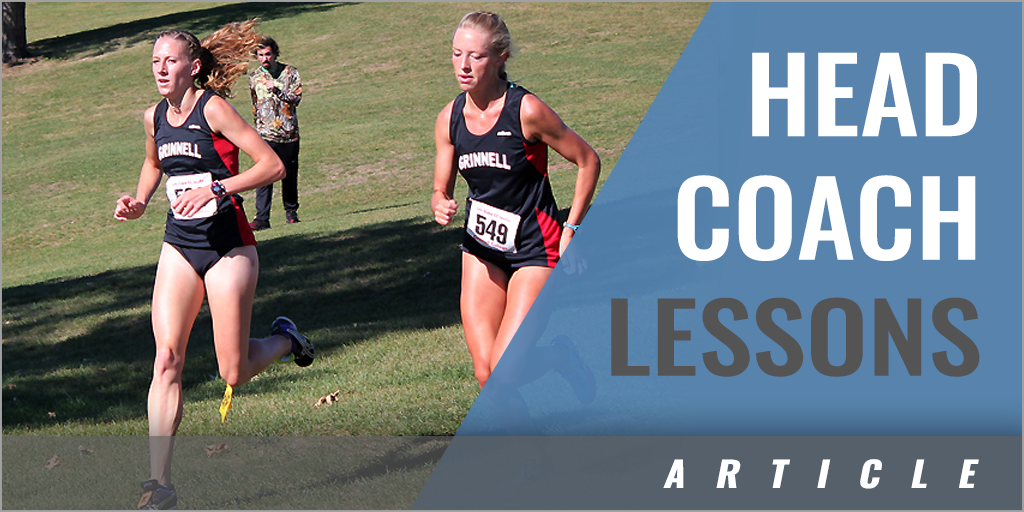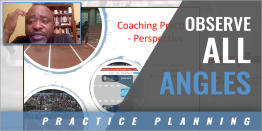|
By: Sarah Burnell, Head Men's & Women's Cross Country Coach - Grinnell College Transitions are hard. We're told this repeatedly anytime we start something new or try something different. The transition to being a head coach is also hard, but you're not alone and it will get easier. This past year was a big transition for me; I fully assumed my new (and first-time) role as a head cross country coach and assisted my two XC teams through a leadership transition after 40 years with the former coaches. As I reflect on my past year of transition, I want to share some of the lessons I learned - and mistakes I made - to help others who might find themselves beginning a similar new chapter. Trust takes time. Being patient while building trust with my athletes is probably the hardest lesson I learned this year. Of course, I didn't expect my athletes to immediately trust me, but I also hadn't anticipated how long it would take for me to earn their trust, either. Some people begin new relationships trusting others immediately, giving them the benefit of the doubt, while other people proceed with caution and cynicism until their trust is earned. Either way, most coaches would agree that building good, trusting relationships with their athletes is key to helping them perform at their best and creating a positive experience on the team. After a few months in my new position, I felt like I had built great relationships with most of my athletes, but I still struggled to connect with a handful. I couldn't figure out what I was doing wrong and was getting frustrated. A mentor of mine reminded me that there may be some athletes who may never fully trust you - especially if you're inheriting a program. I can attest that this realization can be painful, but I encourage you to stay patient and never give up on these athletes. In the final week of our track season, after nine months of daily interaction with my athletes, I finally had a breakthrough moment with a student I had been struggling to reach all year. Be vulnerable. There is a notion that work and personal life should be kept separate, and this feels especially true when we're talking about a job like coaching, where there is a clear power difference between the coach and athletes. Coaches are leaders, mentors, and supporters - not friends - for their athletes. It's important to keep this line clear, of course, but it's also important to show that you are human and are vulnerable, too. According to research by Google on group/team dynamics, showing vulnerability is the biggest facilitator of trust in groups, and groups with the highest degree of trust have the highest rate of performance (Duhigg, 2016). For me, being vulnerable took several different forms. I introduced the team to my family and my dog. I invited them over for pumpkin carving and a backyard bonfire. This all helped them see me outside of our coach-athlete environment. Being vulnerable also meant sharing my thoughts and feelings with them - including the moments that brought me joy and the ones that caused me frustration. I had to practice being transparent with my team; acknowledging when I didn't know the answer, asking them for their help or input, and drawing attention to the moments when I was taking risks and admitting to my mistakes. When I was frustrated that the student-athletes expected me to address all the cultural issues within the team, I told my captains that I needed them to step up and do their part, too. We ask our athletes to be vulnerable with us and their teammates by taking risks, failing sometimes, and then bouncing back and taking more risks in the future. For this to occur, an environment of psychological safety needs to be established. In his research on group dynamics, Daniel Coyle discovered that individuals feel safe enough to take risks and express vulnerability only when they see leaders also expressing vulnerability (2018). So, take time to think about ways that you can demonstrate your vulnerability. You will gain much more than you will lose by showing your true self. Honesty is the best policy. Confrontation is generally uncomfortable. Sometimes it can be made easier when someone violates a clear policy or expectation, but it is never easy, especially when you're still in the process of developing trust and relationships with athletes. However, being honest with athletes about their role on the team, and how they are or are not embodying the standards and expectations set for the group, is key to creating a positive team culture. There is no simple tip or method I can provide to make facilitating these conversations easier, except to say that they take practice, vulnerability, and kindness. Being honest can sometimes cause pain, no matter how kindly that honesty is shared, but athletes will trust you more when they know you care enough to tell them the truth and help outline ways for them become better people. Being honest with your athletes is important to building a good relationship, but being honest with yourself is also key for developing a grounded philosophy. It can be challenging to have a clear vision and expectation for a team when you step into a leadership position, especially when group input is important for buy-in. However, being honest with yourself about what is important to you as a leader lets your athletes know which parts of the experience are and are not negotiable. This was an area that I struggled with a lot this past year. I wanted to take a democratic approach to my leadership, and that brought about lots of good ideas and collaboration, but I wasn't always clear enough about my expectations, and the group responded with confusion and mixed messages between their previous experience and my decision-making choices. For example, when I told them in May that I expected them to do training over the summer, I didn't specify that those who came into the season unprepared would not compete until they had trained for a few weeks. This was a different from expectations in the past and turned into a major point of conflict at the beginning of the season. Not everyone will embrace the non-negotiable aspects of your vision, especially during the transition years from one coach to another, but knowing what you need to lead effectively and create a just environment, and communicating those needs and expectations, is key to long-term success. Find your critical supporters. During transitions, especially those involving groups of people and cohesive group functioning, you will run into rough patches. Your knowledge base and philosophies will be questioned, your team will test your boundaries, and people will disagree with your decisions. Being in a leadership position - especially as a coach - is hard because you are there to serve the people you lead. For coaches, student opinions and experiences matter in determining your success. This can make setting expectations, developing group norms and culture, and being the final decision-maker challenging. Find people who you know will listen to you, be honest with you, and challenge you to think about situations from different perspectives. It's always nice to have someone who will listen and agree with you, but it's more valuable to have someone who will really dig into why you're making a decision and what you're hoping to gain from it. Find the people who will tell you when you've overstepped, when you're taking a balanced approach, and when you're being true to the philosophy, standards, and expectations you've set as a leader. Your critical supporter, who might be a colleague or mentor, will help you navigate challenging team social situations and relationships with student-athletes who don't trust you or disagree with you. They will help you find other ways to connect or communicate. You will make mistakes. Mistakes are inevitable. We are all human, so making mistakes is part of our nature. Making - and admitting to - a mistake can feel like a loss of authority, but it's really an opportunity to make a connection and show vulnerability. As a coach and a leader, I strive to admit to my mistakes; after all, my apology helps my student-athletes learn to acknowledge their own mistakes and make amends with others they might harm in the future. I've made small mistakes, like forgetting to reserve and schedule a bus when we were supposed to take a trip to local nature preserve to run; and I've made bigger mistakes - ones that have unintentionally hurt feelings. The bigger mistakes can feel harder to admit to, because the intention was not to hurt. But taking advantage of these moments is critical for creating an environment of trust and communication. Here's one example. Early in the season, I started naming some of our pool workouts after seniors on the team, such as the "Billy Build Up." After a few weeks of my attempt to spice things up and include different athletes, I received an email from one of our captains stating that the naming of workouts was actually causing harm. My intention had been to include some of our seniors who were injured and in the pool often, but my naming workouts after them made them like their value and identity was tied to their injury status. Not everyone felt this way, but the fact that some felt hurt by my well-intentioned effort was enough for me to make an apology to the whole team. I hope my thoughts outlined here are helpful if you're a new coach or can be an opportunity for reflection for a more seasoned coach. Regardless of where you are in your career, I think the most meaningful piece of advice I've been given is to keep showing up. You'll keep learning and getting better, especially on the days when the work is hard and messy. Works cited: Coyle, D. (2018). The culture code: The secrets of highly successful groups. Bantam. Duhigg, Charles. (2016). What Google Learned From Its Quest to Build the Perfect Team. The New York Times Magazine. https://www.nytimes.com/2016/02/28/magazine/what-google-learned-from-its-quest-to-build-the-perfect-team.html |






